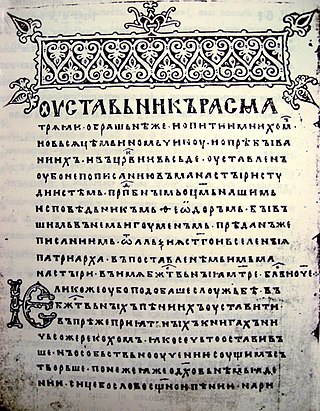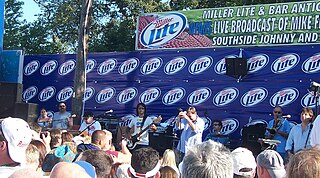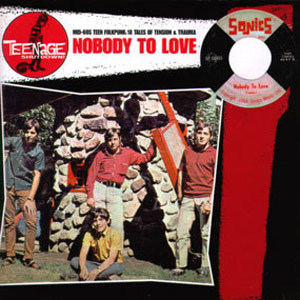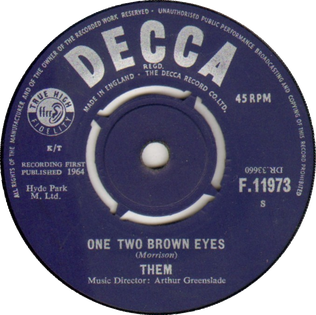
Old Church Slavonic or Old Slavonic is the first Slavic literary language and the oldest extant written Slavonic language attested in literary sources. It belongs to the South Slavic subgroup of the Balto-Slavic branch of the Indo-European language family and remains the liturgical language of many Christian Orthodox churches. Until the reforms of Patriarch Nikon of Moscow between 1652 and 1666, Church Slavonic was the mandatory language of the Russian Orthodox Church.
Garage rock is a raw and energetic style of rock music that flourished in the mid-1960s, most notably in the United States and Canada, and has experienced a series of subsequent revivals. The style is characterized by basic chord structures played on electric guitars and other instruments, sometimes distorted through a fuzzbox, as well as often unsophisticated and occasionally aggressive lyrics and delivery. Its name derives from the perception that groups were often made up of young amateurs who rehearsed in the family garage, although many were professional.

In music, modernism is an aesthetic stance underlying the period of change and development in musical language that occurred around the turn of the 20th century, a period of diverse reactions in challenging and reinterpreting older categories of music, innovations that led to new ways of organizing and approaching harmonic, melodic, sonic, and rhythmic aspects of music, and changes in aesthetic worldviews in close relation to the larger identifiable period of modernism in the arts of the time. The operative word most associated with it is "innovation". Its leading feature is a "linguistic plurality", which is to say that no musical language, or modernist style, ever assumed a dominant position.
Inherent within musical modernism is the conviction that music is not a static phenomenon defined by timeless truths and classical principles, but rather something which is intrinsically historical and developmental. While belief in musical progress or in the principle of innovation is not new or unique to modernism, such values are particularly important within modernist aesthetic stances.

Tony! Toni! Toné! is an American soul/R&B band from Oakland, California, popular during the late 1980s and early to mid-1990s. During the band's heyday, it was composed of D'Wayne Wiggins on lead vocals and guitar, his brother Raphael Saadiq on lead vocals and bass, and their cousin Timothy Christian Riley on drums, keyboards, and background vocals. Originally, the band went by "Tony, Toni, Toné" as a joke, until they realized it "had a nice ring to it".

Irmin Schmidt is a German keyboardist and composer, best known as a founding member of the band Can.

Mersey Beat was a music publication in Liverpool, England in the early 1960s. It was founded by Bill Harry, who was one of John Lennon's classmates at Liverpool Art College. The paper carried news about all the local Liverpool bands, and stars who came to town to perform.

The Panzer-Lehr-Division was an elite German armoured division during World War II. It was formed in 1943 onwards from training and demonstration troops stationed in Germany, to provide additional armored strength for the anticipated Allied invasion of western Europe. On 4 April 1944, the division was officially designated as the 130th Panzer Division; however, it is usually referred to as the Lehr Division. It was the only Wehrmacht Panzer division to be fully equipped with tanks and with halftracks to transport its mechanized infantry. On several occasions it fought almost to destruction, in particular during Operation Cobra, and by the end of the war in Europe bore little resemblance to the unit that had originally been activated.

"You Shook Me" is a 1962 blues song recorded by Chicago blues artist Muddy Waters. Willie Dixon wrote the lyrics and Earl Hooker provided the instrumental backing; the song features Waters' vocal in unison with Hooker's slide-guitar melody. "You Shook Me" became one of Muddy Waters' most successful early-1960s singles and has been interpreted by several blues and rock artists.
"Voodoo Chile" is a song written by Jimi Hendrix and recorded in 1968 for the third Jimi Hendrix Experience album Electric Ladyland. It is based on the Muddy Waters blues song "Rollin' Stone", but with original lyrics and music. At 15 minutes, it is Hendrix's longest studio recording and features additional musicians in what has been described as a studio jam.

Tattvārthasūtra, meaning "On the Nature [artha] of Reality [tattva]" is an ancient Jain text written by Acharya Umaswami in Sanskrit, sometime between the 2nd- and 5th-century CE.

Southside Johnny and the Asbury Jukes are an American musical group from the Jersey Shore formerly led by Southside Johnny. They have been recording albums since 1976 and are closely associated with Bruce Springsteen and The E Street Band. They have recorded or performed several Springsteen songs, including "The Fever" (1973) and "Fade Away" (1980). Springsteen has also performed with the band on several occasions. In 1991, Springsteen and the E Street band appeared on Southside Johnny's Better Days album.
Psychedelic pop is a genre of pop music that contains musical characteristics associated with psychedelic music. Developing in the mid-to-late 1960s, elements included "trippy" features such as fuzz guitars, tape manipulation, backwards recording, sitars, and Beach Boys-style harmonies, wedded to melodic songs with tight song structures. The style lasted into the early 1970s. It has seen revivals in subsequent decades by neo-psychedelic artists.

The Spongetones, formed in 1979, are an American power pop band from Charlotte, North Carolina. They formed from a desire to play Beatles and other 1960s music they grew up with.

Teenage Shutdown! Nobody to Love, sometimes referred to as "Volume 5", is the fifth installment in the Teenage Shutdown! series of garage rock compilations put out by Tim Warren of Crypt Records, which is available on both LP and compact disc formats. This volume was released on October 6, 1998, and consists primarily of folk rock-influenced material, not to mention some protest songs, as indicated in the sub-heading, "Mid-60s Teen Folkpunk: 18 Tales of Tension & Trauma". Like all of the entries in the series, the collection was compiled and mastered by Warren, using original 45 rpm records selected from the collection of garage rock archivist Mike Markesich.
The Grifs were an American garage rock band from Charlotte, North Carolina, who were active in the 1960s. Their song, "Catch a Ride" became the number one hit in Charlotte and did well in markets around the Carolinas, and reached number one in Birmingham, Alabama. The group was able to secure airplay in northern markets, such as in Lansing, Michigan, where it reached number one, as well as in the Detroit area and parts of Canada. They were invited to open for the Amboy Dukes in Detroit, where they began to play frequent engagements in the Michigan region, and recorded their second single, "Keep Dreaming", in Detroit. Just when the Grifs prospects looked hopeful, drummer Roy Skinner departed and guitarist Mike Wingate received a draft notice to go to Vietnam. By early 1968, the group folded. Their work is now highly regarded by garage rock enthusiasts and several of their songs have appeared on compilations.
The Tamrons were an American garage rock band from Concord, North Carolina, near Charlotte who were active in the 1960s. They became one of the most popular bands in Concord and the Charlotte area during the mid-1960s and enjoyed a regional hit with their single, "Wild-Man" backed with "Stop, Look, Listen" recorded at Arthur Smith's studio in Charlotte and released on his Pyramid label. They broke up in 1968. In the intervening years their work has become highly regarded by garage rock enthusiasts and has appeared on several compilations.
The Northern Ireland national amateur football team was the amateur representative team for Northern Ireland at football. It was formed in 1906 and continued until 1974.

Punk TV is an electronic rock band from Novosibirsk, Russia. It was founded in 2003.

"One Two Brown Eyes" is a song written by Van Morrison, originally recorded by his group Them in 1964. After leaving an Irish showband, Morrison returned to his hometown of Belfast, where he joined up with guitarist Billy Harrison, bassist Alan Henderson and keyboardist Eric Wrixon and formed the band that would eventually become Them. "One Two Brown Eyes" most likely originated during jam sessions at the Maritime Hotel where Them had a residency. After featuring it on a demo, Them were signed to Decca Records by Dick Rowe who also produced the studio recording of it on 5 May 1964.













